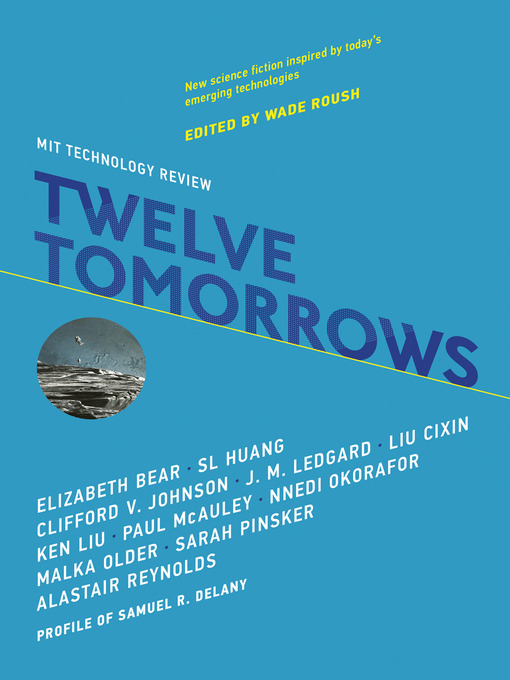Soh Kam Yung reviewed Twelve Tomorrows by Wade Roush
An interesting anthology of stories about possible tomorrows, and includes a profile of Samuel R. Delany.
3 stars
An interesting anthology of stories about possible tomorrows. It starts with a profile of Samuel R. Delany, by Mark Pontin and Jason Pontin. Interesting stories include those by SL Huang, Ken Liu, Liu Cixin, Clifford V. Johnson, Sarah Pinsker and Alastair Reynolds.
-
"The Woman Who Destroyed Us" by SL Huang: in a future where deep brain stimulation (DBS) is prevalent, a mother seeks against a DBS researcher who she believes altered her problematic son and made him unrecognizable to her. But when she puts her plan into motion by befriending the researcher's companion, she begins to learn uncomfortable facts about DBS and the ethics of the researcher she was targeting that would lead her to question her own motives and, perhaps, lead to reconciliation with her DBS altered son.
-
"Okay, Glory" by Elizabeth Bear: the CEO of a company suddenly finds himself trapped inside the isolated smart home he designed when hackers convince the AI in charge of the house that there has been an apocalypse, forcing the house to 'protect' him by not letting him out. As the days pass and his efforts to leave gets more desperate, he finally realizes that the only way to escape may be to make the house intelligent enough to realize what is actually happening.
-
"Byzantine Empathy" by Ken Liu: in a future where the blockchain (the technology that ensures transactions like cryptocurrencies are recorded and distributed) is ubiquitous, one person attempts to sidestep non-profit charities by directly ensuring cryptocurrency payments go directly to refugees and other recipients. But that turns out only to be the first part of her plan to draw attention towards a conflict at the border of Myanmar that the rest of the world would rather forget about, as too much attention could cause a wider conflict.
-
"Chine Life" by Paul McAuley: in a future where artificial life (the chine) has taken over much of the earth, one of the last remaining refuges of humanity sends a patrol to a rendezvous point to negotiate with it. What the patrol discover would rewrite what actually happened to the earth when the artificial life took over, and what hope remains for humanity.
-
"Fields Of Gold" by Liu Cixin, translated by Ken Liu: a malfunctioning rocket sends one astronaut on a one way journey out of the solar system. The desire and race to rescue her, as transmitted via remote presence videos from the rocket, would eventually end when a rescue mission arrives and makes an unexpected discovery.
-
"Resolution" by Clifford V. Johnson: a story told in graphic form of a secret meeting attended by an AI researcher, who discovers that the AI technological utopia she helped to bring about may not be what she expects. And she now leads an effort to change the world based on what she now knows to be the truth.
-
"Escape From Caring Seasons" by Sarah Pinsker: a resident at an elderly care centre begins to suspect that the AI in charge of the place has been altered to 'optimize' caring for the elderly inhabitants to the point of restricting their freedom of movement. She decides to 'escape' to make contact with the outside world about their plight. But she would need the help of a sympathetic person, looking to get gamer points from the search for her, to get the attention she desires.
-
"The Heart Of The Matter" by Nnedi Okorafor: the Nigerian President needs a new heart, and one made of organic material arrives. But the operation to replace his heart would be full of drama as a group of people, ousted by the President's move to clean up corruption, try to violently seize the moment in a coup.
-
"Different Seas" by Alastair Reynolds: a clipper ship at sea encounters difficulties after a global event causes its electronics to malfunction. A telepresence operator works with the ship's captain to fix the problem. During the subsequent conversation, the captain discovers the operator also has problems of her own that are not so easy to fix.
-
"Disaster Tourism" by Malka Older: a telepresence pilot on a disaster mission runs into an unexpected problem when her drones disintegrate, but not before finding evidence that some people has survived the disaster. But helping them would turn out to be a problem when it turns out the contamination that destroyed the drones may have been released during the disaster from an experimental lab. In the debate between helping or isolating the survivors, the pilot may have to make some decisions on her own.
-
"Vespers" by J. M. Ledgard: the musings of an intelligence on a ship bound on a many thousand years trip to another star.

